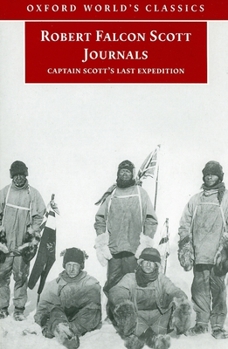Robert Falcon Scott Journals: Captain Scott's Last Expedition
Select Format
Select Condition 
Book Overview
In January 1912, Britain's Captain Robert F. Scott reached the South Pole, only to find he had been beaten by Roald Amundsen's Norwegian expedition. Scott and his companions faced an 850-mile march to safety. All perished on the return. A few months later, a search party found Scott's body and the journals that told his tragic story.
Scott's own account was published to extraordinary acclaim in 1913. This new edition draws on ninety years of reflection...
Format:Paperback
Language:English
ISBN:0199297525
ISBN13:9780199297528
Release Date:November 2006
Publisher:Oxford University Press, USA
Length:592 Pages
Weight:0.91 lbs.
Dimensions:0.9" x 7.7" x 5.0"
Customer Reviews
5 ratings
Extraordinary experience with an explorer of the Antarctic
Published by Thriftbooks.com User , 14 years ago
We had taken a trip to Antarctica on which lecturers referred often to Robert Scott. When we returned and I got this book, it became a reading experience like no other. Since everyone knows he and his men die at the end, that was not a surprise. The surprise was learning through the pages what would be the deciding factors that would ultimately cause their return to fail. Since I read thirty minutes a day, the unfolding drama read like a postcard from Scott to a sister or aunt telling events as they happened. Because it is a diary and includes the thoughts of a person, I came to know him like a friend. The book taught me how difficult it is to endure the challenges of Antarctica on a long term basis. It was an extraordinary experience with a book which I will always remember. May many others read this book and marvel at the character, motivation, determination and greatness of an amazing man.
A Great Classic
Published by Thriftbooks.com User , 16 years ago
I am reading the original 1913 edition. This is a truly great book. It is very well written, very exciting, and so far brutally honest. It is quite clear where the British made mistakes but that should not be the point. This is a journal by a great explorer who was writing events as they happened. It is full of praise for his men. Scott also criticizes himself for his errors in judgment. In a sense, the die was cast: they had lost many of their animals and nearly lost their lives before the main trek to the pole even started. And they were now forced into a race for the pole, which had never been their intention. They could not quit, as this would have been a national disgrace. So they went ahead anyway, hoping that hard work, the weather, and shear luck would prevail. But it didn't. Ironically, just a year later, many British solders would be facing the same hopeless odds in the battlefields of WW1 France. This is a classic (tragic) story, told as it happened by a fine author. I highly recommend it.
Scott?s was the greater achievement
Published by Thriftbooks.com User , 20 years ago
About halfway through this diary account of the Terra Nova expedition, it becomes clear why Amundsen made it first to the pole ... and why Scott's was the greater achievement. The Norwegians focused completely on getting to the pole and back: no fuss, no elaboration, no scientific spin-offs. Amundsen cared not a whit about paleobotany, the discovery of a new parasite in fish livers or pony psychology. (More to the point, Amundsen kept to dogs.) Scott took an interest in everything, and he was willing to experiment. The diaries brim with accounts of sledging diets, weather balloons, penguin dissections, ice crystal formation, geologic strata and killer whales. He writes of what it is like to be without the sun for four months, of feelings stirred by the aurora australis, and of the colors of ice and sea and sky. He describes camp life and daily routines and the antics of ponies and dogs. And, knowing he has failed in his goal, he speaks movingly of his obligations to his country ... and to science. Among the items dragged to their final camp by three exhausted, half-frozen dying men were 35 pounds of fossils - fossils which would help rewrite geologic history.
Dress warmly to read this one
Published by Thriftbooks.com User , 22 years ago
While the story is known to most armchair explorers, nothing beats the saga right from the horse's mouth. Yes, the journal does drag in places, but so do long days of waiting in the Antarctic. It makes us impatient and edgy, wondering if the storms will ever end or what equipment will break next. Knowing the climax detracts nothing from how they got there--or didn't. This and Shackleton's own story really have to be read if one enjoys this kind of tale.
Scott's diaries
Published by Thriftbooks.com User , 24 years ago
The authoritive reference for what happened on Scott's polar journey - since it was written by the man himself. Don't be put off by the appalling introduction by Bainbridge (which ruins the story if you don't know all the details since it is just a brief summary of the rest of the book - just skip it!). I wouldn't recommend reading this first (try Scott by Elspeth Huxley as an intro) but for historical interest if you get into the history of the antarctic this is a must. The actual description of the southern journey only makes up the final section of the book, most of it is concerned with the depot laying and over wintering parts of the expedition. As such most of the book is mostly concerned with the details of preparing for the journey and hence probably won't appeal as a general introduction to Scott's last expedition.






